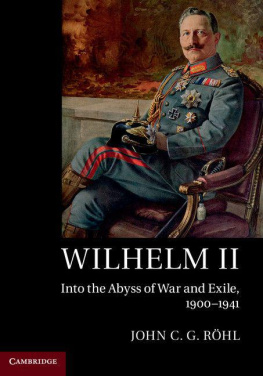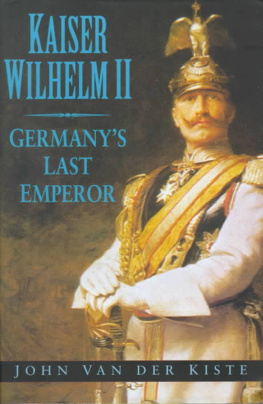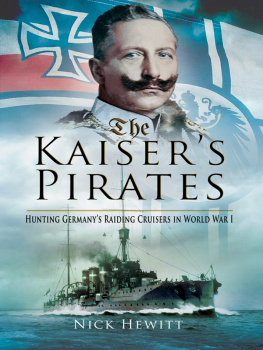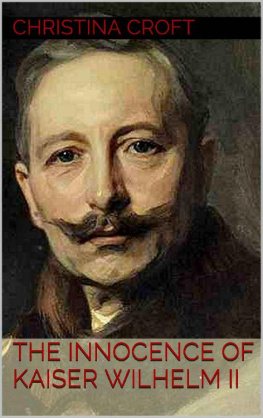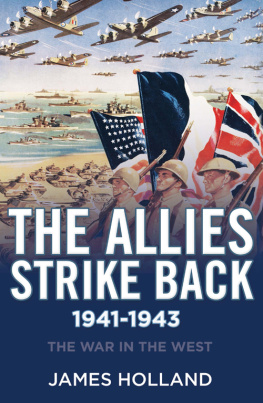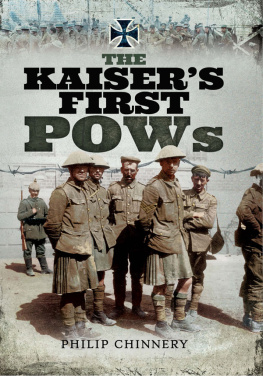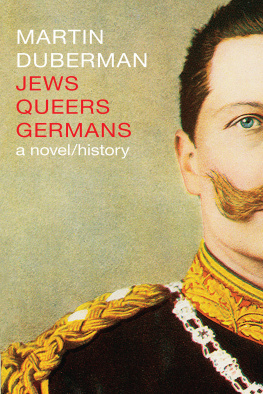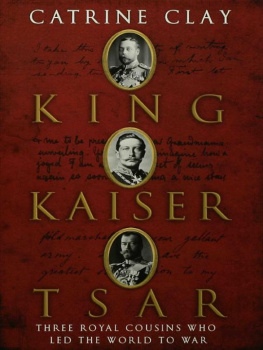University Printing House, Cambridge CB2 8BS, United Kingdom
Published in the United States of America by Cambridge University Press, New York
Cambridge University Press is part of the University of Cambridge.
It furthers the Universitys mission by disseminating knowledge in the pursuit of education, learning and research at the highest international levels of excellence.
www.cambridge.org
Information on this title: www.cambridge.org/9780521844314
This publication is in copyright. Subject to statutory exception and to the provisions of relevant collective licensing agreements, no reproduction of any part may take place without the written permission of Cambridge University Press.
Originally published in German as Wilhelm II. Der Weg in den Abgrund 19001941 by Verlag C. H. Beck Mnchen John C. G. Rhl, 2008
First published in English by Cambridge University Press, 2014 as Wilhelm II: Into the Abyss of War and Exile 19001941 John C. G. Rhl 2014
English translation John C. G. Rhl 2014
Printed in the United Kingdom by Berforts Information Press
A catalogue record for this publication is available from the British Library
Library of Congress Cataloguing in Publication data
Rhl, John C. G.
[Wilhelm II. English]
Wilhelm II : into the abyss of war and exile / John C. G. Rhl; translated by Sheila de Bellaigue and Roy Bridge.
pages cm
ISBN 978-0-521-84431-4 (Hardback)
1. William II, German Emperor, 18591941. 2. GermanyPolitics and government18881918.
3. GermanyHistoryWilliam I, 18711888. I. De Bellaigue, Sheila, 1945, translator.
II. Bridge, F. R., translator. III. Title.
DD229.R641284 2014
943.084092dc23 2013005149
ISBN 978-0-521-84431-4 Hardback
Cambridge University Press has no responsibility for the persistence or accuracy of URLs for external or third-party internet websites referred to in this publication, and does not guarantee that any content on such websites is, or will remain, accurate or appropriate.
Illustrations
Acknowledgements
Figure 1
Royal Collection Trust/ Her Majesty Queen Elizabeth II 2012
Figure 3
Bildarchiv Preuischer Kulturbesitz/Staatsbibliothek zu Berlin/Eugen Jacobi
Figures 4, 31, 60
Jost Rebentisch, Die vielen Gesichter des Kaisers . Wilhelm II. in der deutschen und britischen Karikatur , Berlin 2000
Figures 5, 29
Viktoria Luise, Duchess of Brunswick-Lneburg, Ein Leben als Tochter des Kaisers , Gttingen and Hanover 1965
Figures 6, 56
Historisches Archiv Krupp, Essen
Figures 7, 10, 11, 28, 35, 38, 48
Adolf von Achenbach et al., Unser Kaiser. Fnfundzwanzig Jahre der Regierung Kaiser Wilhelms II. , Stuttgart 1913
Figures 12, 43
ullstein bild, Berlin
Figures 14, 54, 59, 67, 70, 71
J. A. DeJonge, Wilhelm II , Amsterdam 1986
Figures 15, 33, 36, 37, 39, 40, 42, 45, 46, 51, 53, 58, 69
Viktoria Luise, Duchess of Brunswick-Lneburg, Bilder der Kaiserzeit , Gttingen 1970
Figures 16, 50
Bildarchiv Preuischer Kulturbesitz, Berlin
Figures 22, 23
Maurice Baumont, LAffaire Eulenburg , Geneva 1973
Figure 24
Ian Stevenson Collection
Figure 30
Bernhard Frst von Blow, Denkwrdigkeiten , 4 vols., Berlin 19301
Figure 32
Imperial War Museum, London
Figure 44
Bildarchiv Preuischer Kulturbesitz, Berlin/Heinrich Hoffmann
Figure 47
Jeffrey Finestone
Figure 55
Herr Warner Poelchau
Figure 57
ullstein bild/Bildarchiv Preuischer Kulturbesitz, Berlin/Willy Rmer
Figure 60
Reproduced with permission of Punch Ltd.
Figures 61, 62
Brigitte von Klitzing
Figure 63
Bildarchiv Preuischer Kulturbesitz, Berlin/Walther Haus
Figure 64
Hans Wilderotter and Klaus-D. Pohl, eds., Der letzte Kaiser. Wilhelm II. im Exil , Gtersloh and Munich 1991 (photo: Nederlands Filmmuseum)
Figure 65
Deutsches Historisches Museum, Berlin
Preface to the English edition
He has been Emperor just over 30 years, he did great things for his country but his ambition was so great that he wished to dominate the world & created his military machine for that object... Now he has utterly ruined his country & himself & I look upon him as the greatest criminal known for having plunged the world into this ghastly war which has lasted over 4 years & 3 months with all its misery. and in the last years of the armed peace their anger and frustration at being thwarted diplomatically reached boiling point.
The archival evidence for the mounting determination of Wilhelm II, the army and navy leaders and finally the civilian statesmen, too, to deploy military force to achieve their ambitious ends is quite overwhelming, and it is perhaps a measure of the profound and enduring consensus brought about in Germany by the Fischer controversy of fifty years ago that these conclusions occasioned little comment there when the German edition of this volume was published in 2008. Instead, the books lively reception was dominated by a subordinate question, that of the Kaisers personal responsibility for the catastrophe. Had he, rather than the elites in general, as structuralist historians had claimed, really wielded such decisive power, particularly after the twin domestic disasters of his reign, the disgrace of his favourite, Prince Philipp zu Eulenburg, in the homosexuality scandals of 19069 and the Daily Telegraph crisis of 1908?
Needless to say, this volume pays due attention to the elites that governed the Prusso-German Kaiserreich. The testimony of the men in positions of power and of other insiders is liberally quoted and their responsibilities and shortcomings are analysed throughout. But what were the power relationships between them and the monarch? When there was dispute, as there always is in high politics, say between the army and the navy over resources, or between the navy and the Reich Chancellor and his advisers in the Wilhelmstrasse over negotiations with Britain, who had the final say? Who had appointed these army, navy and civilian leaders in the first place, and who had the right to dismiss them at will? The manner in which Wilhelm II operated the kingship mechanism in order to dominate decision-making after Bismarcks dismissal in 1890 is the central issue addressed in the second volume of this biography, By this time, Szgyny had been in charge of the embassy in Berlin for more than two decades. Would he have been mistaken on a question of such existential importance to his disintegrating multinational Empire at such a critical time?

